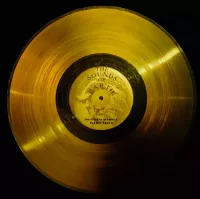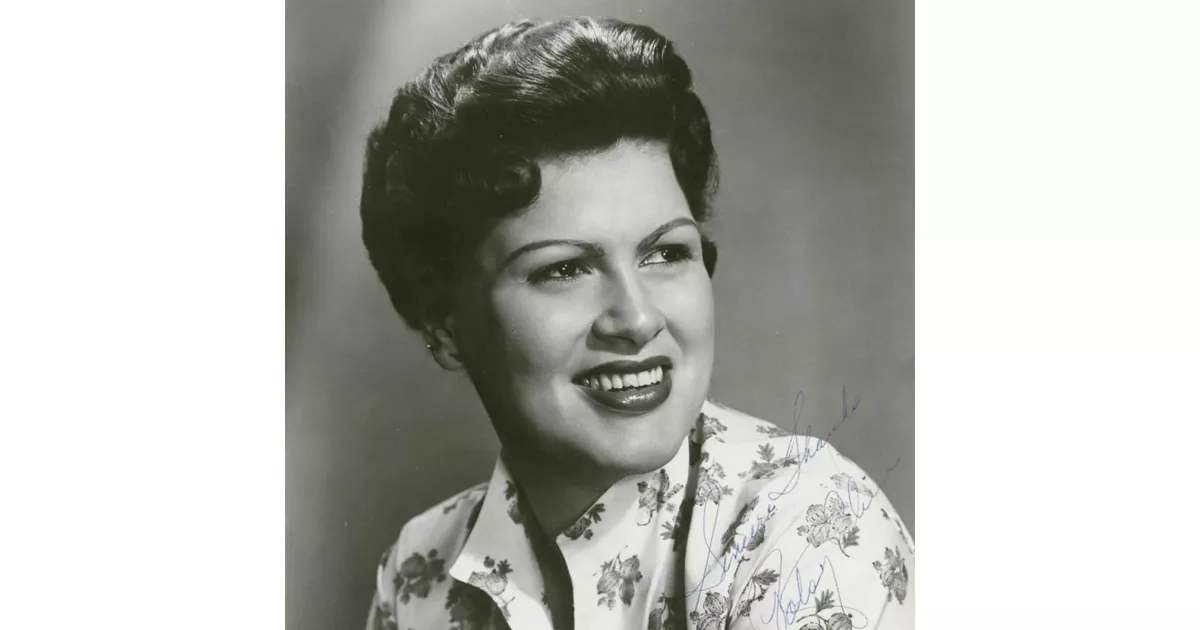Patsy Cline, a celebrated American singer from Virginia, left an indelible mark on 20th-century music. Her powerful vocals made her a leading figure in country music, and she achieved a rare feat by achieving crossover success in pop music. Cline's impressive eight-year recording career saw her produce numerous hits, with several topping the Billboard charts, solidifying her legacy as a musical legend.
September 8, 1932: Birth of Patsy Cline
Patsy Cline, originally named Virginia Patterson Hensley, was born on September 8, 1932. This marked the beginning of a legendary journey for the iconic American singer.
1947: Family Hardships and Cline's Departure from School
Patsy Cline's father deserted the family in 1947, leading to financial struggles. As a result, Cline dropped out of high school to help support her family and took a job as a clerk and soda jerk.
1947: Cline's Father Deserts the Family
Patsy Cline's father, Samuel Hensley, deserted the family in 1947.
1952: Patsy Cline Joins Bill Peer's Band and Adopts Stage Name
Patsy Cline's musical journey took a significant turn in 1952 when she auditioned for and joined Bill Peer's band. It was during this time that she adopted her stage name, "Patsy Cline", marking the beginning of her professional identity.
March 7, 1953: Patsy Cline's First Marriage
Patsy Cline married Gerald Cline on March 7, 1953. They met while she was performing with Bill Peer at the Moose Lodge in Brunswick, Maryland.
August 1953: Patsy Cline Wins Local Music Contest
Patsy Cline's talent earned her recognition in August 1953 when she won a local country music contest, leading to a cash prize and a regular performance spot on Connie B. Gay's Town and Country Time.
September 30, 1954: Patsy Cline Signs Record Deal with Four Star Records
On September 30, 1954, Patsy Cline secured a two-year recording contract with Four Star Records, marking a significant step in her career. The deal, signed alongside Bill Peer and her husband, Gerald Cline, paved the way for her entry into the music industry.
1954: Patsy Cline Signs with Four Star Records
In 1954, Patsy Cline secured her first recording contract with Four Star Records, marking a significant step in her professional singing career.
January 5, 1955: Patsy Cline's First Recording Session
On January 5, 1955, Patsy Cline embarked on her first recording session in Nashville, Tennessee. Under the guidance of producer Owen Bradley, this session marked the beginning of her professional relationship with Bradley, which would shape her musical journey in the years to come.
October 1955: Patsy Cline Becomes a Regular on "Town and Country Time"
After impressing audiences with her talent, Patsy Cline officially joined the cast of Connie B. Gay's "Town and Country Time" in October 1955, gaining wider exposure and recognition for her dynamic stage presence and unique singing style.
1955: Early Recordings with Owen Bradley
Between 1955 and 1960, Patsy Cline worked with producer Owen Bradley on recordings that, despite showcasing her vocal talent, were hampered by weaker material.
1955: Release of "A Church, a Courtroom, Then Goodbye"
Patsy Cline released "A Church, a Courtroom, Then Goodbye" in 1955, one of her early singles with Four Star Records, achieving moderate success.
1955: Start of Patsy Cline's Recording Career
Patsy Cline's recording career began in 1955, marking the start of her journey to becoming a country music legend.
1955: Patsy Cline Releases Singles, Performs Regionally, and Faces Challenges
Throughout 1955, Patsy Cline released four singles with Four Star Records, but none of them achieved significant success. Despite this setback, she remained active in the music scene, performing regionally, including appearances at notable events like the Town and Country Jamboree.
1956: Separation of Patsy and Gerald Cline
By the end of 1956, Patsy and Gerald Cline began living separately due to growing differences and challenges in their marriage.
1956: Release of "I've Loved and Lost Again"
In 1956, Patsy Cline released "I've Loved and Lost Again", another single with Four Star Records, as she continued to build her career.
1956: Patsy Cline's Career Takes Shape with TV Appearances and a New Marriage
In 1956, Patsy Cline's career gained momentum with notable television appearances, including a spot on ABC's Country Music Jubilee, Ozark Jubilee, further expanding her exposure to a wider audience. This year was also significant in her personal life as she met Charlie Dick, who would become her second husband.
1956: Cline's Father Dies
In 1956, Samuel Hensley, Patsy Cline's father, died of lung cancer. Despite his past actions, Cline and her mother visited him in the hospital in Martinsburg, West Virginia, shortly before his passing.
1956: Patsy Cline Meets Charlie Dick
Patsy Cline and Charlie Dick first encountered each other in 1956 while Cline was performing with a local band in Virginia. Despite a rocky start, their relationship blossomed.
1956: Release of "Walkin' After Midnight"
Patsy Cline released "Walkin' After Midnight" in 1956, which became one of her most recognized songs.
January 18, 1957: Patsy Cline's Breakthrough Performance on Arthur Godfrey's Talent Scouts
On January 18, 1957, Patsy Cline's life took a dramatic turn as she traveled to New York City, marking the beginning of a pivotal moment in her career that would soon catapult her to national recognition.
August 1957: Patsy Cline Releases Debut Album
August 1957 marked the release of Patsy Cline's debut studio album under Decca Records, a significant milestone in her career, solidifying her presence in the music industry.
September 15, 1957: Patsy Cline's Second Marriage
Patsy Cline married Charlie Dick on September 15, 1957. They had met the previous year while Cline was performing with a local Virginia band.
September 1957: Patsy Cline Faces Career Challenges, Personal Changes, and a Move to Nashville
September 1957 marked a period of significant transition for Patsy Cline. She faced setbacks in her career, including being let go from her regular spot on Town and Country Jamboree due to personal struggles. Amidst these challenges, she married Charlie Dick, and they welcomed their first daughter, Julie. Determined to reignite her career, the family relocated to Nashville, Tennessee, a hub of country music.
1957: Patsy Cline's Marriage
In 1957, Patsy Cline embarked on a new chapter in her life as she got married.
1957: Patsy Cline's Reflection on Illness and Vocal Transformation
In 1957, Patsy Cline reflected on a childhood illness, revealing how a severe throat infection and rheumatic fever at age 13 may have impacted her voice, saying it left her with a "booming voice" after her recovery.
1957: Cline's Appearance on "Arthur Godfrey's Talent Scouts"
In 1957, Patsy Cline was required to wear an evening dress instead of her preferred cowgirl attire for her appearance on "Arthur Godfrey's Talent Scouts".
1957: Divorce of Patsy and Gerald Cline
Patsy Cline and Gerald Cline officially divorced in 1957 after facing marital difficulties and a period of separation.
1957: Patsy Cline's Breakthrough on Arthur Godfrey's Talent Scouts
Patsy Cline made her national television debut on Arthur Godfrey's Talent Scouts in 1957. Her performance of "Walkin' After Midnight" catapulted her to fame, becoming a major hit on both country and pop charts.
1958: Patsy Cline Becomes a Mother
Patsy Cline experienced motherhood for the first time in 1958, giving birth to a child.
January 1960: Patsy Cline Joins the Grand Ole Opry and Signs with Decca Records
January 1960 marked a pivotal moment in Patsy Cline's career as she achieved a lifelong dream by becoming an official member of the prestigious Grand Ole Opry. This significant accomplishment solidified her status as a respected figure in country music.
November 1960: Patsy Cline Records "I Fall to Pieces," a Song That Would Define Her Legacy
In November 1960, Patsy Cline stepped into the recording studio to record "I Fall to Pieces," a song penned by the renowned Nashville songwriting duo, Hank Cochran and Harlan Howard. Little did she know at the time, this session would mark a turning point in her career and cement her place in music history.
1960: Patsy Cline Joins Decca Records and the Grand Ole Opry
Patsy Cline's career reached new heights in 1960 as she joined the prestigious Grand Ole Opry and signed with Decca Records under the guidance of producer Owen Bradley, leading to a significant shift in her musical style and consistent success.
1960: Cline's Musical Shift
Patsy Cline's musical style saw a significant shift around 1960, with her earlier recordings considered less impactful compared to her later successes.
January 1961: "I Fall to Pieces" Released, Marking a Turning Point in Music History
January 1961 witnessed the release of "I Fall to Pieces" as a single. Though its initial reception was lukewarm, the song gradually gained traction and began its ascent on the charts. Its eventual success would not only redefine Patsy Cline's career but also leave an indelible mark on the landscape of popular music.
June 14, 1961: Patsy Cline's Life-Threatening Car Accident
On June 14, 1961, tragedy struck when Patsy Cline and her brother, Sam Hensley Jr., were involved in a severe car accident. The incident resulted in life-threatening injuries for Cline, including a broken wrist, dislocated hip, and a deep cut across her forehead. The event shook the music world and left fans anxious about her recovery.
July 1961: Cline Performs at the Cimarron Ballroom
In July 1961, following a car accident, Patsy Cline gave a one-night performance at the Cimarron Ballroom in Tulsa, Oklahoma.
October 1961: "Crazy" Released as a Single
In October 1961, Patsy Cline released "Crazy" as a single. The song would go on to be a huge crossover hit, peaking at number 2 on the Billboard country charts and number 9 on the pop charts.
November 1961: Cline Performs at Carnegie Hall, Wins Awards
Patsy Cline performed at Carnegie Hall alongside other Grand Ole Opry stars in November 1961. By the end of the year, she had won several major music industry awards, including "Favorite Female Vocalist" from Billboard Magazine.
December 17, 1961: Cline Records "She's Got You"
On December 17, 1961, Patsy Cline recorded "She's Got You," a song written by Hank Cochran.
1961: Triumph and Tragedy: "I Fall to Pieces" and Cline's Accident
1961 marked a year of triumph and tragedy for Patsy Cline. Her single "I Fall to Pieces" topped the Billboard country chart, but she was seriously injured in a car accident, leading to a month-long hospitalization.
1961: Cline Returns to Stage After Accident
Just six weeks after a car accident in 1961, Patsy Cline bravely returned to her career. Her first public appearance was at the Grand Ole Opry where she assured her devoted fans that she would continue performing. She expressed her gratitude to the audience, acknowledging their unwavering encouragement during her recovery.
1961: Cline Forms Close Friendship with Loretta Lynn
Patsy Cline and Loretta Lynn's friendship began in 1961 after Cline heard Lynn's radio performance of "I Fall to Pieces" shortly after Cline's car accident. Cline was so impressed that she sent her husband to bring Lynn to her so they could meet. They developed a deep and supportive friendship, with Cline acting as a mentor to Lynn, offering both professional guidance and personal support.
1962: "She's Got You" Becomes Crossover Hit
In 1962, "She's Got You" became Patsy Cline's third country-pop crossover hit, reaching number 1 on the Billboard country chart and even charting in the United Kingdom.
1962: Cline Headlines in Las Vegas, Experiences Setbacks
In the summer of 1962, Patsy Cline faced professional setbacks when a planned country music film fell through. Later that year, seeking financial security, Cline took a 35-day engagement at the Merri-Mint Theatre in Las Vegas, becoming the first female country artist to headline her own show there. Despite this milestone, she found the experience challenging, battling homesickness and vocal strain.
1962: Cline's Success Leads to Homeownership and More Hits
Patsy Cline enjoyed a string of hit songs in 1962, including "When I Get Through with You," "So Wrong," and "Imagine That." Her career successes brought financial stability, enabling her to purchase her first home in Goodlettsville, Tennessee, a suburb of Nashville.
1962: Continued Success and Live Performances
Patsy Cline enjoyed a string of hits in 1962, including "She's Got You", "When I Get Through with You", "So Wrong", and "Leavin' on Your Mind". This period also saw her touring and headlining shows more frequently.
1962: Hensley Preserves Cline's Legacy Through Costumes
Patsy Cline's mother, Hilda Hensley, played a significant role in preserving her daughter's legacy. She meticulously maintained a collection of Cline's stage costumes, including a dazzling sequined dress worn during a performance in Las Vegas in 1962.
1962: Cline's Image Shift at the Merri-Mint Theatre
Patsy Cline's performance at the Merri-Mint Theatre in Las Vegas in 1962, where she donned a sequined cocktail dress, marked a shift in her public image from cowgirl attire to more glamorous outfits.
January 1963: Cline Releases "Leavin' on Your Mind"
Patsy Cline released the single "Leavin' on Your Mind" in January 1963, which soon after debuted on the Billboard country chart.
March 3, 1963: Patsy Cline's Final Performance
On March 3, 1963, despite suffering from a cold, Patsy Cline performed three shows at the Soldiers and Sailors Memorial Hall in Kansas City, Kansas. This event was a benefit concert for the family of disc jockey "Cactus" Jack Call. Her final song was "I'll Sail My Ship Alone," which she had recorded just the previous month.
March 5, 1963: Death of Patsy Cline
On March 5, 1963, Patsy Cline's life and career were tragically cut short in a plane crash. Her untimely death left a void in the music world and solidified her status as a legend.
March 1963: Tragic Plane Crash
In a devastating turn of events, Patsy Cline, along with Cowboy Copas, Hawkshaw Hawkins, and manager Randy Hughes, died in a plane crash in March 1963 while returning to Nashville from Kansas City, Missouri.
October 1963: "Faded Love" Chart Success
In October 1963, Patsy Cline's single "Faded Love" reached the top 10 on the Billboard country chart, peaking at number 7.
1963: Death of Patsy Cline
Patsy Cline tragically passed away in 1963.
1965: Charlie Dick's Second Marriage
Charlie Dick, Patsy Cline's widower, married country artist Jamey Ryan in 1965.
1967: Repackaging of "Patsy Cline's Greatest Hits"
Capitalizing on the renewed interest in Cline's music, MCA Records repackaged and re-released her 1967 "Greatest Hits" album in 1988 as "12 Greatest Hits."
1967: Release of Greatest Hits Album
Patsy Cline's greatest hits album was released in 1967, featuring a compilation of her most popular and influential songs.
1973: Posthumous Recognition: Induction into the Country Music Hall of Fame
In 1973, Patsy Cline became the first female performer to be inducted into the Country Music Hall of Fame, solidifying her legacy as a pioneer in country music.
1973: Induction into the Country Music Hall of Fame
In 1973, Patsy Cline was inducted into the Country Music Hall of Fame, becoming the first solo female artist to receive this honor.
1975: Bill Frazee Purchases Cline's Live Recording
Bill Frazee purchased a tape in 1975 that included Patsy Cline's live recording from the Cimarron Ballroom in July 1961.
1977: Loretta Lynn's Tribute Album Release
Loretta Lynn, a friend and mentee of Patsy Cline, released a tribute album titled "I Remember Patsy" in 1977. The album featured covers of Cline's songs, including "Back in Baby's Arms" and "Crazy".
1980: Resurgence of Patsy Cline's Music
The 1980s saw a revival of interest in Patsy Cline's music. Her version of "Always" charted on Billboard, and an album of the same name reached the top 30 on the Billboard Top Country Albums chart. This renewed interest was further fueled by the release of the Loretta Lynn biopic "Coal Miner's Daughter" (1980).
1980: "Coal Miner's Daughter" Renews Interest in Cline
The release of the Loretta Lynn biopic "Coal Miner's Daughter" in 1980, which featured Patsy Cline as a character played by Beverly D'Angelo, renewed interest in Cline's life and career.
1985: Release of Patsy Cline Biopic Soundtrack
Coinciding with the release of Patsy Cline's biographical film in 1985, a soundtrack album was released, achieving considerable success by peaking at number 6 on the Billboard country albums chart.
1985: Revelation of Abuse in "Sweet Dreams"
Details of the alleged sexual abuse Patsy Cline suffered from her father were revealed by her mother, Hilda Hensley, to the producers of the 1985 biopic "Sweet Dreams". Cline had previously confided in her friend Loretta Lynn, urging her to "take this to your grave".
1985: Patsy Cline Biopic "Sweet Dreams"
The biographical film "Sweet Dreams", starring Jessica Lange as Patsy Cline, premiered in 1985, further introducing Cline's story and music to a wider audience.
1985: Release of "Sweet Dreams" Biopic
The feature film "Sweet Dreams", starring Jessica Lange as Patsy Cline, was released in 1985. The film, while commercially successful and praised for Lange's performance, faced criticism for historical inaccuracies.
1987: Markers and Bell Tower in Winchester, Virginia
In 1987, Patsy Cline's hometown of Winchester, Virginia honored her with markers throughout the town and a bell tower erected at her burial site in Shenandoah Memorial Park.
1988: Repackaging of "Patsy Cline's Greatest Hits"
Capitalizing on the renewed interest in Cline's music, MCA Records repackaged and re-released her 1967 "Greatest Hits" album in 1988 as "12 Greatest Hits."
1988: Release of the Musical "Always...Patsy Cline"
The musical "Always...Patsy Cline" debuted in 1988, celebrating Cline's life and music on stage.
1988: Premiere of "Always...Patsy Cline"
The musical "Always...Patsy Cline", based on Cline's friendship with Louise Seger, premiered in 1988.
1989: "The Real Patsy Cline" Documentary Released
The documentary "The Real Patsy Cline", featuring interviews with friends and fellow artists, was released in 1989.
1990: Chart Success of "12 Greatest Hits"
The repackaged "12 Greatest Hits" album, originally released in 1967, reached number 27 on the Top Country Albums chart in 1990.
1991: Critically Acclaimed Box Set Release
A comprehensive box set of Patsy Cline's recordings was released in 1991, receiving critical acclaim and further solidifying her musical legacy.
1991: Release of "The Patsy Cline Collection"
MCA Records released Patsy Cline's first boxed set, "The Patsy Cline Collection," in 1991. The collection featured all of Cline's recordings for Four Star and Decca Records and garnered positive reviews.
1991: Release of "A Closer Walk with Patsy Cline" Musical
The musical "A Closer Walk with Patsy Cline", a retelling of Cline's career, was released in 1991.
January 1992: The Patsy Cline Collection Reaches Billboard Charts
In January 1992, "The Patsy Cline Collection", a box set of her music, reached number 29 on the Billboard country albums chart.
1993: United States Postal Stamp Series
Patsy Cline was featured on United States postal stamps in 1993 as part of their "Legends" series, honoring her significant contributions to country music.
1994: Mandy Barnett Debuts in "Always...Patsy Cline"
Mandy Barnett debuted as Patsy Cline in the musical "Always...Patsy Cline" at the Ryman Auditorium in 1994.
1994: "Remembering Patsy" Documentary Aired
The documentary "Remembering Patsy", hosted by Michelle Wright, aired in 1994, featuring interviews with artists like Roy Clark, George Jones, and Trisha Yearwood.
1995: "Big Dreams and Broken Hearts: The Dottie West Story" Airs on CBS
In 1995, the television movie "Big Dreams and Broken Hearts: The Dottie West Story", which featured Patsy Cline's friendship with Dottie West, debuted on CBS. Actress Tere Myers played Cline.
1995: Grammy Lifetime Achievement Award and Grammy Hall of Fame Inductions
Patsy Cline received a Grammy Lifetime Achievement Award in 1995, recognizing her significant contributions to music. Additionally, her iconic songs "I Fall to Pieces" and "Crazy" were inducted into the Grammy Hall of Fame.
1997: Release of "Live at the Cimarron Ballroom"
In 1997, MCA released "Live at the Cimarron Ballroom", a rare recording of Cline's performance at the Cimarron Ballroom in Tulsa, Oklahoma in July 1961.
1998: Hensley Passes Away
Hilda Hensley, Patsy Cline's mother, passed away from natural causes in 1998.
1998: Death of Patsy Cline's Mother and Legal Disputes
In 1998, Patsy Cline's mother passed away, 35 years after Cline's own death. This event led to legal battles between Cline's surviving siblings over their mother's estate, resulting in the auction of many of Cline's possessions to cover legal expenses.
August 1999: Hollywood Walk of Fame Star
Patsy Cline received a star on the Hollywood Walk of Fame in August 1999, solidifying her iconic status in the entertainment industry.
1999: Universal Music Acquires Decca Records
Decca Records, the label that held Patsy Cline's music catalog, was acquired by Universal Music in 1999.
1999: VH1's "100 Greatest Women of Rock and Roll"
Patsy Cline was ranked number 11 on VH1's list of the "100 Greatest Women of Rock and Roll" in 1999, showcasing her influence beyond country music.
2003: CMT's "40 Greatest Women of Country Music"
Country Music Television (CMT) included Patsy Cline on their list of the "40 Greatest Women of Country Music" in 2003, recognizing her significant contributions to the genre.
2003: Tribute Album: "Remembering Patsy Cline"
Forty years after her passing, MCA Nashville released a tribute album titled "Remembering Patsy Cline" in 2003. The album featured covers of songs from Cline's 1967 greatest hits album by artists from various genres.
2005: Guinness World Record for "Patsy Cline's Greatest Hits"
In 2005, "Patsy Cline's Greatest Hits" earned a place in the Guinness World Book of Records for being the album by a female artist to have the longest run on any record chart.
2005: Childhood Home on National Register of Historic Places
Patsy Cline's childhood home in Winchester, Virginia received an official historical marker and was listed on the National Register of Historic Places in 2005.
2005: Diamond Sales for Greatest Hits Album
Patsy Cline's greatest hits album achieved a remarkable milestone in 2005, surpassing 10 million copies sold.
2007: "Crazy" Praised by Music Critics
In 2007, "Crazy" continued to garner acclaim, solidifying its status as a beloved country music standard. Music critics consistently praised Cline's soulful vocals and the song's exceptional production. They highlighted the raw emotion and "ache" in Cline's delivery, recognizing its contribution to the song's enduring appeal.
2010: Rolling Stone's "100 Greatest Singers of All-Time"
Patsy Cline earned a spot at number 46 on Rolling Stone's list of the "100 Greatest Singers of All-Time" in 2010, highlighting her exceptional vocal abilities and lasting impact on music.
August 2011: Opening of the Patsy Cline House
After renovations, Patsy Cline's childhood home in Winchester, Virginia opened to the public as a museum in August 2011, allowing fans to learn about her upbringing.
2011: Patsy Cline House Museum Opens
Patsy Cline's childhood home in Winchester was restored and opened to the public as a museum in 2011, offering fans a glimpse into her early life and career.
2015: Death of Charlie Dick
Charlie Dick, Patsy Cline's second husband, passed away in 2015 and was laid to rest beside Cline.
2015: Opening of the Patsy Cline Museum
Following the death of her father, Charlie Dick, in 2015, Patsy Cline's daughter, Julie Simadore, helped open a museum dedicated to her mother in Nashville, Tennessee.
March 2017: PBS Releases "American Masters" Documentary on Cline
In March 2017, PBS aired a documentary about Patsy Cline as a part of their American Masters series, featuring interviews with fans, including Beverly D'Angelo and Reba McEntire.
2017: D'Angelo Reflects on Playing Cline
In 2017, Beverly D'Angelo, who played Patsy Cline in "Coal Miner's Daughter", reflected on the role in a PBS documentary, stating it had a "profound impact" on her life.
2017: Rolling Stone's "100 Greatest Country Artists of All-Time"
Rolling Stone ranked Patsy Cline at number 12 on their 2017 list of the "100 Greatest Country Artists of All-Time," further solidifying her legendary status within country music.
2017: Opening of the Patsy Cline Museum
The Patsy Cline Museum opened in Nashville, Tennessee in 2017, showcasing her stage costumes, personal belongings, and career memorabilia.
July 2019: Trailer Release for "Patsy & Loretta"
The trailer for the Lifetime movie "Patsy & Loretta" was released in July 2019.
October 2019: "Patsy & Loretta" Premieres on Lifetime
The Lifetime original television film "Patsy & Loretta", chronicling the friendship between Patsy Cline and Loretta Lynn, premiered in October 2019.
2023: Rolling Stone's "200 Greatest Singers of All Time"
In 2023, Rolling Stone ranked Patsy Cline at number 13 on their list of the "200 Greatest Singers of All Time," a testament to her enduring vocal prowess and influence on generations of singers.
Mentioned in this timeline
CBS or CBS Broadcasting Inc is a major American commercial...

Reba McEntire known as The Queen of Country is a...

Las Vegas Nevada's most populous city and the seat of...
Virginia a state in the Southeastern and Mid-Atlantic US lies...

A car also known as an automobile is a wheeled...

Music is a cultural universal involving the arrangement of sound...
Trending

26 minutes ago Kyshawn George's Injury Update: Cleared to Play After Toe Issue
4 months ago Trump defends Tucker Carlson's Nick Fuentes interview amid antisemitism concerns.
26 minutes ago Fire at US embassy in Riyadh after drone strike amid Iran-US tensions.
27 minutes ago Julian Reese's Two-Way Contract: Angel Reese's Inspiring Message and Wizards' New Addition

1 hour ago Peyton Stearns, Texas Longhorn, triumphs at ATX Open, securing second WTA title.

2 hours ago Tom Steyer's California plan faces criticism while he spends millions on governor's race.
Popular

Jesse Jackson is an American civil rights activist politician and...

Hillary Diane Rodham Clinton is a prominent American politician lawyer...

Jim Carrey is a Canadian-American actor and comedian celebrated for...

XXXTentacion born Jahseh Dwayne Ricardo Onfroy was a controversial yet...

Kashyap Pramod Patel is an American lawyer who became the...

Barack Obama the th U S President - was the...
